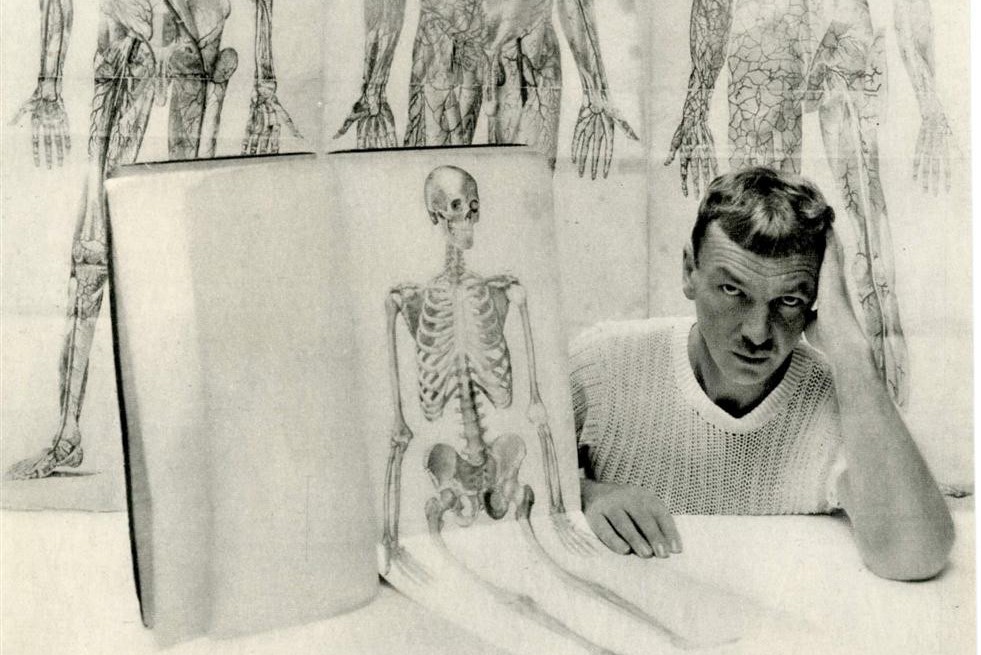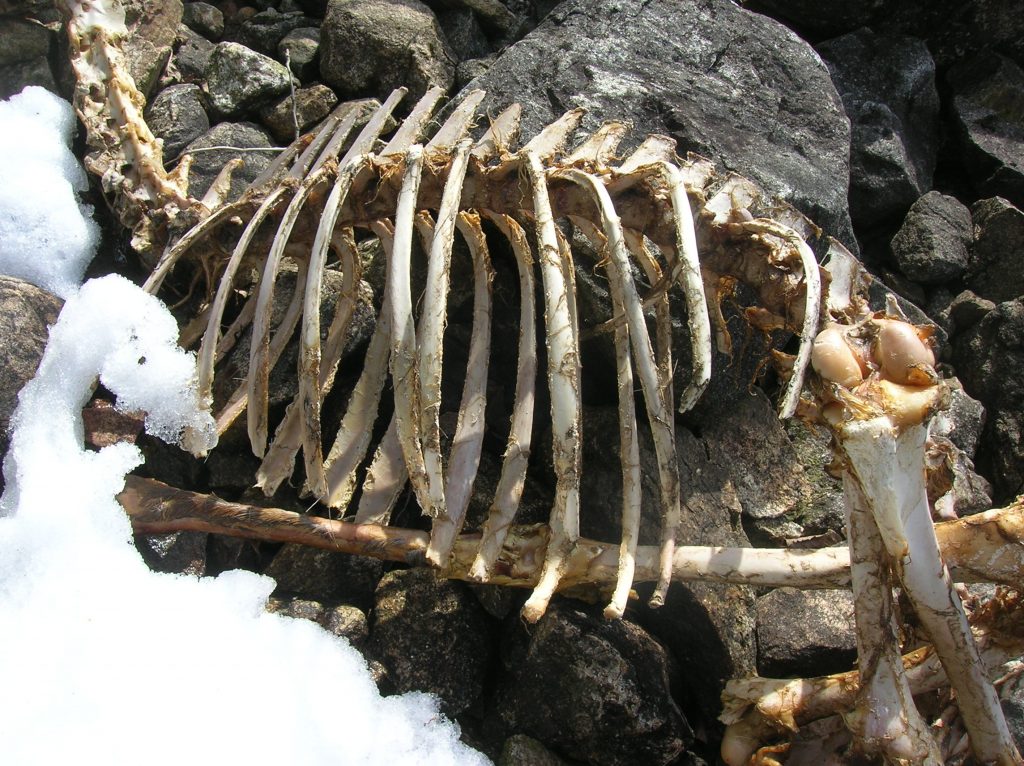“Poem for George Platt Lynes,” by Wayne Koestenbaum, appeared in the Winter 1998 issue of MQR.
*
George Platt Lynes photographed a naked man, curled
into a snailshell’s infinite regress, and I want
to follow suit, my body a starfish, my skin seized
with a Polaroid purchased on a serious
whim: may I become Lincoln Kirstein or Monroe Wheeler,
wide palms full of fortune, or the sailor
my master of the pick-up
stick picked up and froze in a print
hid in the Kinsey Institute until too recently!
I see so many cuties on 23rd Street, they must be an industry—
members of an international underground élite
gathered to plot the overthrow
of dogma—living replicas
of Lynes’s Orpheus, whose stubble
calls back from pandemonium the foreskins,
pimples and ingrown hairs, each paradoxical
nipple lit like Dietrich’s angel—
I hold sacred the right to look, and will I turn
pornographer? Before falling asleep I was again terrified
nuance would forever resist being enclosed
by a poem, however much it wandered from the point,
so I thought, “Why not say this in prose?”
but then on waking reconsidered, and so I’ll replay dying
Violetta singing farewell, asking Alfredo to give
her image—daguerrotype?—to his future
virgin bride, whose arms, hypotheses, are pure—
take this picture and tell your girlfriend
I’m now an angel watching you in heaven. . . .
I fell asleep promising that when I rose
I’d write a poem that did elaborate justice
to this world, but instead, in my Roman
slumber, Sophia Loren, Marcello Mastroianni
and Fellini visited and refused
to say what new film they were working on.
I begged, “Tell me before you spill it to the press.”
Sophia was singing Aida at the Met
and Colette hogged the parterre toilet—
none of the nobility waiting in line had a chance
to urinate before the Surgeon General
sent the fire curtain down on the Nile scene.
I am not a fake. I have two friends, three
or four children, five fathers, and a host
of tropical fish. A copycat, I photograph Tommy,
my first grade friend, who moved on Chanukah—
depressed pink light crimping the horizon’s skirt,
God mimicking Schiaparelli:
when I visited his new abode, nothing was the same,
the rooftop swept the sun
into green hatchets, and his house abutted on a marsh
which I never had the good fortune to fall into
else I’d now be giving you something keener than this sordid
compromise between deceit and grief. At last
I have a playmate to rival that original, and plenty
of cultural references thrown in, five-
spice powder, a predilection for the long walk, long
haul, not much fuss, closure
kept to a minimum, and hyperbole reigning
in her usual kimono, the color of merlot—
the silk one hanging in my closet smells awful,
I’ll never go to that cheap tailor again
(she charged only seven bucks for intricate repairs).
Walking along the Hudson in 1977
beside an imaginary Balanchine troupe’s prima
ballerina, I saw, on the pier,
a man with top Levi’s button opened
showing groin hair, and I thought,
“Ditch the ballerina and follow this mariner toward his deeps.”
I didn’t inspect his belly’s superscript
or footnotes, nor the tattoo, serving notice
like Madame Defarge, nor did I value,
at half her worth, the dancer, her navel bearing
superior complexity, if I’d known how to see it.
I dreamt a great poet drove me to Philadelphia.
Her mother disapproved of my defection
from orthodox practices, and I persuaded her that tapioca
was a good idea for a dinner party; then my mother
walked onstage without warning during a poetry reading
I was trying to give, and she said, “I’m sorry I’m late,
this is not normal behavior, but I have urgent errands.”
I am dreaming of a blue notebook
that admits every atmospheric tic, the despicable
difference between haute and bas,
the small talk of my umpteen loves, my hand
opening the window to invite
warm rain, and sunset rouging the street
my father’s uncle trudges up to bring a box of See’s
chocolates on Christmas day—the uncle who, by marrying
a Catholic, survived Germany,
then moved to California to sort and deliver mail and give me,
for high-school graduation, one thousand envelopes
engraved with my name and the wrong return address:
I disgrace the family by mentioning
graves and emptiness
without also describing the accompanying
ameliorating handkerchiefs
and armchairs, philosophy lessons
and the Rubinstein concert in Caracas—”You have no irony,”
my friend says, whose scarves are orchestral,
and I reply, “I have no sincerity.” I used to weep
after every haircut, smothered by uncertainty—
which look did I want, butch or meandering?
“D’ja know?” is my new expression,
unconscious homage to Djuna Barnes—do you know
what I mean, do you know what I seek, do you know
that duration has not redistributed its fathoms since our last
supper, and do you greet the sky’s openness
to opium as if its saturnalian curriculum
made you and me
the sole descendants of the Ballets Russes?
Before quitting
(accept this photograph, dear, and know
that an angel gazes down on your happiness)
promise that you will not destroy the magic net
the marooned December moon
casts over casual thought; promise you will give moments
on odd afternoons for such pleasure
as a photograph affords—I’m thinking of the Rudy Burkhardt shot
of a solitary Brooklyn studio, its few, faint
artifacts fastidiously arranged on a table—a room
that might have been my mother’s, had her childhood
looked out to the Bridge rather than to my own parched future birth,
and had she worn clean oxfords in the old photo
I kept on my dormitory wall (her face pushes
against her brother’s chest, and the light’s unkind)
beside an index card bearing a typed Pound quote
about the immorality of not staring the subject
straight in the eye, or else about Gaudier-Brzeska’s death
in the Great War—
had she worn not unlaced boots but clean smackers,
a kind of giggly shoe
that John Bunny, best fat comedian of the silent screen,
might have longed for,
were he to lose the girth that made him famous;
and promise I will not curtail
memory’s melisma into the gaudy carnival
float shapes I have been pursuing for too many years—
Prendi, quest’è l’immagine de’ miei passati giorni—
squandered days in a whirling cyclone downstream,
who dares capture or call you home before the figure, nude
on the silver plate that oversees these lines,
raises his hand to feel the fine light fail?
*
Image via The Red List: Lynes, George Platt. Detail of “Skeletons (Jared French).” 1947.



